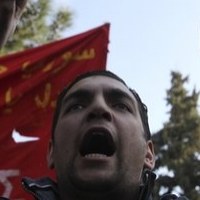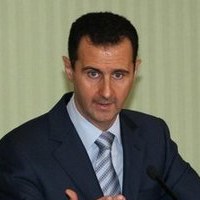![]()
Sat, Feb 05, 2011 | WikiLeaks
WikiLeaks: Germany Ready to Support Iran Sanctions
German MFA A/S equivalent for Non Proliferation and Disarmament Gottwald told House Foreign Affairs Committee Staff Director Richard Kessler that Germany was ready to support sanctions on Iran, especially ones which target the leadership and minimize impact on the general population. Germany would prefer to see action taken within the UNSC, but is concerned about Chinese commitment. Iran Task Force Director Krueger said Germany was looking at measures in sectors involving transportation (Air Iran and shipping), banking, Liquefied Natural Gas (LNG) and Compressed Natural Gas (CNG), as well as exploring ways to target the IRGC leaders. NEA Iran/Maghreb DAS equivalent Ralph Tarraf said Germany was also exploring ways to bring Iranian Human Rights violations before the UN offices in Geneva. Tarraf also advocated taking Turkish initiatives on Iran seriously while not publicly endorsing them. Experts from XXXXXXXXXXXX advocated for a ban on weapons sales to Iran, covert sabotage of the Iranian nuclear program, and focusing efforts to find a negotiated solution more directly in the office of the Supreme Leader.
Source: WikiLeaks
2010-01-21 T11:33:00
C O N F I D E N T I A L SECTION 01 OF 03 BERLIN 000081
SIPDIS
E.O. 12958: DECL: 01/22/2020
TAGS: PGOV, PREL, KNNP, IR, GM
SUBJECT: GERMAN MFA HOPE IRAN SANCTIONS TARGET LEADERS NOT MASSESClassified By: Pol M/C George Glass for reasons 1.4 b/d
1. (C) SUMMARY. German MFA A/S equivalent for Non Proliferation and Disarmament Gottwald told House Foreign Affairs Committee Staff Director Richard Kessler that Germany was ready to support sanctions on Iran, especially ones which target the leadership and minimize impact on the general population. Germany would prefer to see action taken within the UNSC, but is concerned about Chinese commitment. Iran Task Force Director Krueger said Germany was looking at measures in sectors involving transportation (Air Iran and shipping), banking, Liquefied Natural Gas (LNG) and Compressed Natural Gas (CNG), as well as exploring ways to target the IRGC leaders. NEA Iran/Maghreb DAS equivalent Ralph Tarraf said Germany was also exploring ways to bring Iranian Human Rights violations before the UN offices in Geneva. Tarraf also advocated taking Turkish initiatives on Iran seriously while not publicly endorsing them. Experts from XXXXXXXXXXXX advocated for a ban on weapons sales to Iran, covert sabotage of the Iranian nuclear program, and focusing efforts to find a negotiated solution more directly in the office of the Supreme Leader. End Summary.
—————————————-
IMPORTANCE OF UNSCR; CONCERN ABOUT CHINA
—————————————-
2. (C) Gottwald summarized the German position on Iran Sanctions emphasizing the importance of getting a new UNSCR passed sooner rather than later during a January 6 meeting. He noted it would be difficult, but important, to keep Russia and China on board. He said no one is enthusiastic about sanctions, but all agree that Iranian refusals to reach an agreement must carry a price. He quoted Chancellor Merkel’s speech to Congress in November and said Germany had “zero tolerance” for a nuclear armed Iran and was ready to support sanctions. He expressed greater concern over the Chinese commitment to sanctions than Russian. Putting the current Iran discussion into a broader context Gottwald worried that Iran could become a spoiler in the upcoming NPT RevCon.
—————————————-
GOAL OF SANCTIONS: HIT LEADERS NOT PEOPLE
—————————————–
3. (C) When asked by Kessler what Germany would like to see in a UNSCR or EU measures on Iran, Gottwald and MFA Deputy A/S equivalent for Trade and Export Control Lingemann remained vague in their answers. Gottwald said the EU could be counted on to take its guidance from the next UNSCR on Iran and enact measures to enforce and strengthen the UNSCR. In particular he expected the EU to take action to target specific leaders with visa bans and perhaps other measures. Gottwald said Germany would like to see measures have a direct effect on Iranian leaders, and to minimize the effect on the population. Gottwald called petrol sanctions a “mixed blessing” noting that they give the government an excuse to cut subsidies which puts the burden onto the general population and money back in government budgets. Lingemann said denying access to certain exploration/extraction technology could be an effective tactic since it would more directly impact the government’s pocketbook and ability to “buy friends” abroad. He stressed that we need measures that do not generate a commiseration effect from other countries. Lingemann noted that while a broad UNSCR was preferable, there were still some technological areas (such as CNG/LNG related technologies) in which U.S. and EU companies have a monopoly on the market and where Russian and Chinese companies can’t compete should EU wide measures be needed. He also said that targeted measures that impact Iran’s refining capabilities can be effective as they have an immediate impact on the government’s income.
4. (C) Iran Task Force Director Krueger, in a separate meeting, specifically mentioned transportation (Iran Air and shipping), banking, and LNG/CNG sectors as areas on which Germany was looking to focus UNSC or EU action. He said Germany was also interested in targeting the IRGC but was still wrestling with how to best do so. He noted that the U.S. had based its justification on the IRGC’s terrorist associations with Hezballah, but since Hezballah is not recognized as a terrorist organization in Europe that wouldn’t work. He said his colleagues were looking at possible action against the IRGC for violations of Human Rights and thought that might be more workable in the European context, but they were open to suggestions.
BERLIN 00000081 002 OF 003
——————————————
EXPLORING WHAT TO DO ON HUMAN RIGHTS FRONT
——————————————
5. (C) NEA Iran/Magreb DAS equivalent Ralph Tarraf noted that Germany was looking at whether and how to bring the Iranian Human Rights violations before the UN offices in Geneva. He said it was important to make clear to the Iranian government that we are concerned about their human rights violations and that the concern is not purely a “Western” phenomena but rather a global one. He said February 15 is a key date as that is when the Iran country review process will take place in Geneva. He added that Germany is discussing listing the IRGC both under the non-proliferation regime and now also for its human rights violations. He noted that it was important to keep the two separate sanctions tracks separate and not to confuse the proliferation and human rights issues.
——————————————— —
CAN ENGAGEMENT WORK? IS THERE A ROLE FOR TURKEY?
——————————————— —
6. (C) On the issue of whether continued engagement with the Iranian government undermines the opposition, Gottwald stressed that it is important that engagement not be construed to “favor” Ahmadinejad, but rather we should continue, as we have, on a purely “logical” basis. He said he was concerned that the current Iranian government may be incapable of coming to any conclusions, but that doesn’t mean we should let up on our pressure. Tarraf said we face the “worst situation possible” with a weak regime that is not yet close to regime change. He suggested we focus on new forms of access to the regime which would allow for discrete talks to continue at a high-level. Gottwald added that he thought it was important to look for other mechanisms such as the TRR proposal which can serve as disincentives to continue down the nuclearization path.
7. (C) Tarraf said he saw increased Saudi/Iranian rivalry in the Gulf region and suggested the West avoid putting all its “eggs in one basket” behind the Saudis. He suggested looking for other allies in the region who can be constructive such as Turkey. He admitted that Turkey had abstained in the IAEA and expressed reluctance on sanctions, but these positions also afforded them greater leverage with the Iranians. He suggested we consider taking Turkish initiatives seriously without publicly endorsing them. He agreed that to date Turkish promises – on Syria/Israel and Iran- have not yielded any results, but he advocated giving Turkey a quiet nod of approval to see if they can deliver.
——————————————-
ARMS BAN, SABOTAGE, FOCUS ON SUPREME LEADER
——————————————-
8. (C) XXXXXXXXXXXX argued that the only effective sanctions which could positively impact the regime’s security calculations on the nuclear dossier would be a ban on sales of conventional arms. Only such a move could shift the security calculation for the regime from the longer term goal of achieving nuclear capability to the shorter term goal of maintaining a conventional capability. He warned that ineffective sanctions could be worse than no sanctions, especially if they send more money to the IRGC’s pockets (through increasing necessity of procurement on the black market which is dominated by the IRGC.) In the interim XXXXXXXXXXXX recommended that a policy of covert sabotage (unexplained explosions, accidents, computer hacking etc) would be more effective than a military strike whose effects in the region could be devastating.
9. (C) XXXXXXXXXXXX offered some insights into the inner workings of the regime and postured that the TRR deal had failed because the Supreme Leader (SL) hadn’t committed himself to the deal 100 percent. He said any deal would have to have the full blessing of the SL and said that once negotiations in the SL’s office (or with his closest confidants) began, success would be guaranteed since the SL – by definition- never fails. He noted that the SL has his representatives at every level of government, but some have greater access to him than others. The three with greatest access, according to XXXXXXXXXXXX, at the moment are his son Mojtaba, Ayatollah Golpaygani and Hejazi.
BERLIN 00000081 003 OF 003
10. (U) This cable has been cleared by StaffDel Kessler.
MURPHY



 RSS
RSS












#WikiLeaks: #Germany Ready to Support #Iran #Sanctions | #Nuclear #US #UN #EU http://j.mp/gYQyW8
RT @CrethiPlethi: #WikiLeaks: #Germany Ready to Support #Iran #Sanctions | #Nuclear #US #UN #EU http://j.mp/gYQyW8